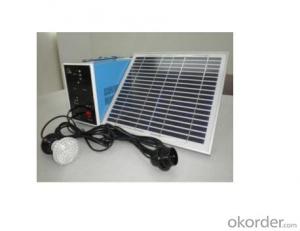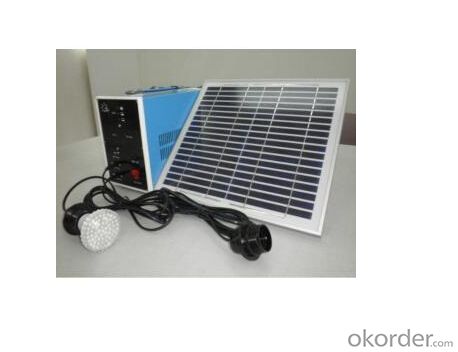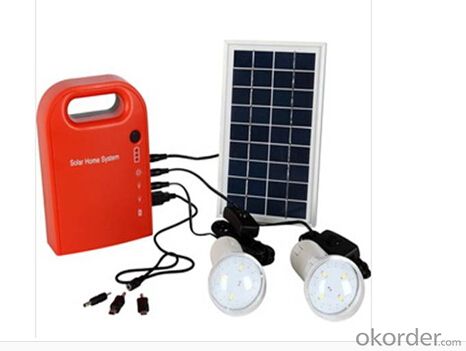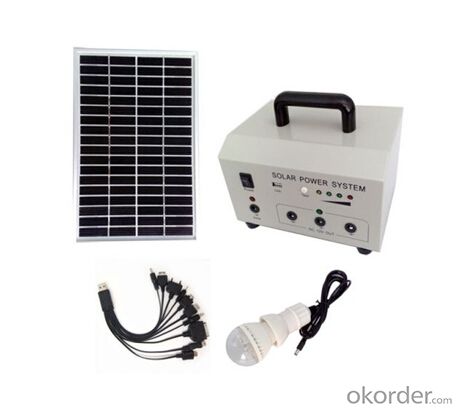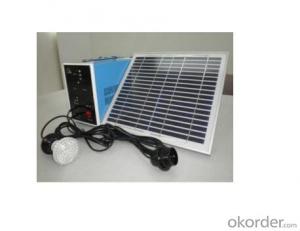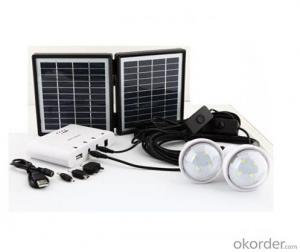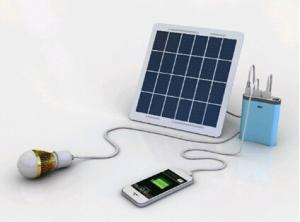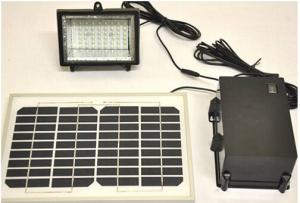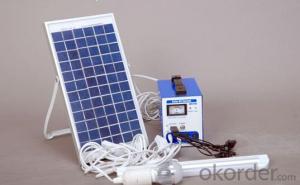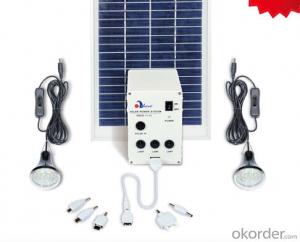Sun Vision Solar Energy Systems - CNBM Solar Home System Roof System Capacity-15w
- Loading Port:
- Shanghai
- Payment Terms:
- TT or LC
- Min Order Qty:
- 5 unit
- Supply Capability:
- 30000 unit/month
OKorder Service Pledge
OKorder Financial Service
You Might Also Like
Introduction of Solar Home System
Solar Home System is quite suitable product in urban area and the place which is short of electricity. Our Small Solar Home System own great benifits compare with other kind electricity resources:
Electricity generating cost of Solar Home System is much cheaper than diesel engine. Beside low electricity making cost, solar system products also have the features of noiseless, clean energy, environmentally friendly and can access to many different electric appliance.
Working Principle of Solar Home System
The stand alone Solar Home System is an off-grid solar system which uses batteries to store the solar energy. Stand alone solar system solutions design for those who are not able or willing to connect to electricity grid.
However, our on-grid solar home system can be connected to the grid for utilization of grid electricity power. Our solar system can add relative equipment as our customer’s requirement which have the function of switching to city electricity automatically. The solar system can use battery power in priority, if sunshine is not so good or loads consumption is too high which cause battery power insufficient. Then system can switch automatically to grid power supply. Meanwhile, the system can charge the batteries with grid power until batteries are fully charged. Then the solar system will switch back to battery power supply.
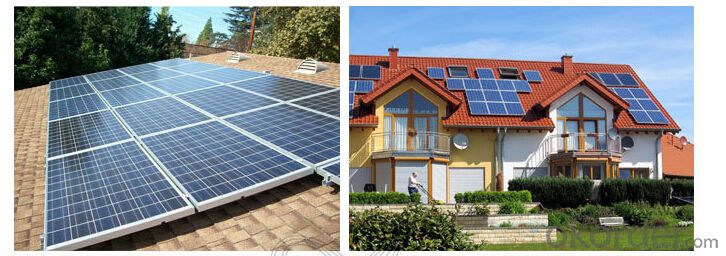


Specification of Solar Home System
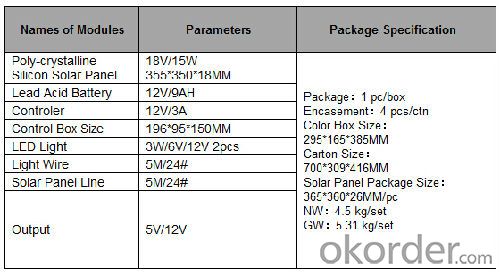
Advantage of Our Solar Home System
1 Excellent Performance: Our Solar Home System is composed by Brand Standard Kits with high quality. Our solar system has the advantage of high efficiency and stable operation. We can ensure our product with a long life period.
2. Small Orders Accepted: We can accept small orders as our customer’s trial order.
3. Warehouse: We have warehouse overseas which can bring great convenience to our customer to pick up the products.
FAQ
Q: Could you introduce the background of your company?
A: We are a Group corp. with 1GW capacity in China, which is Okorder’s registered VIP Supplier, possess Financial Service from Okorder.com.
Q: Required mainly certificates (CE&IEC/TUV/RoHS)?
A: Our products are certificated by CE RoHS, IEC, ISO, TUV, UL etc.
Q: Your main exported market is?
A: Main markets of our products is: South-east Asia, Mid-east, Arica, East Europe and Latin America.
- Q: What is the average payback period for a solar energy system?
- The average payback period for a solar energy system varies depending on various factors such as the system's size, location, installation costs, energy usage, and available incentives. However, on average, a residential solar energy system can pay for itself within 6 to 10 years, while commercial systems may have a payback period of 4 to 8 years. It's important to note that with advancements in technology and decreasing installation costs, the payback period for solar systems is continually decreasing, making it a more financially viable option for many.
- Q: How do solar energy systems impact social equity?
- Solar energy systems can have a positive impact on social equity by providing access to clean and affordable energy for all. By reducing reliance on fossil fuels, solar energy helps to mitigate climate change, which disproportionately affects marginalized communities. Additionally, solar power can create job opportunities and stimulate local economies, promoting social and economic development.
- Q: Can solar energy systems be used for industrial process heat?
- Yes, solar energy systems can indeed be used for industrial process heat. Solar thermal technologies, such as concentrating solar power (CSP) and solar water heating, can efficiently capture and convert sunlight into heat energy. These systems can provide a reliable and sustainable source of heat for various industrial processes, including manufacturing, drying, sterilization, and space heating. By utilizing solar energy, industries can reduce their reliance on fossil fuels, lower greenhouse gas emissions, and decrease operating costs in the long run.
- Q: Can solar energy systems be used in powering desalination plants?
- Yes, solar energy systems can be used to power desalination plants. Solar-powered desalination systems use solar panels to convert sunlight into electricity, which is then used to power the desalination process. This sustainable approach not only reduces reliance on fossil fuels but also helps address the water scarcity issue by producing freshwater from seawater in an environmentally friendly manner.
- Q: Is it possible to store excess electricity generated by a solar energy system?
- Excess electricity generated by a solar energy system can indeed be stored. One way to do this is by using batteries, which are commonly employed for this purpose. Battery banks can be integrated into solar energy systems to store surplus electricity produced during the day, allowing it to be utilized at night or during periods of low sunlight. By charging and discharging as necessary, these batteries ensure a consistent and dependable power supply, even in the absence of sunlight. Another means of storing excess electricity is through grid-tied systems. In this configuration, any surplus power generated by the solar energy system is fed back into the electrical grid. The excess electricity is then credited to the homeowner's account, enabling them to draw power from the grid during times when their solar panels are unable to generate enough energy, such as at night or on cloudy days. Both battery storage systems and grid-tied systems offer effective solutions for storing and utilizing surplus electricity generated by solar energy systems. These methods ensure that no energy is wasted and enable homeowners to enjoy a reliable and uninterrupted power supply.
- Q: Can solar energy systems be used for powering off-grid eco-retreats?
- Yes, solar energy systems can be effectively used for powering off-grid eco-retreats. Solar panels can convert sunlight into electricity, providing a sustainable and renewable energy source for various applications such as lighting, heating, and powering electronic devices. These systems can store excess energy in batteries for use during cloudy days or at night, ensuring a reliable power supply. By harnessing solar energy, off-grid eco-retreats can reduce their ecological footprint and promote a more sustainable and environmentally-friendly way of living.
- Q: Can solar energy systems be used in powering music studios or recording studios?
- Certainly, music studios or recording studios can definitely utilize solar energy systems for power. Solar power systems present a clean and renewable energy source that offers a reliable and economical solution for operating various electrical equipment, including the energy-intensive equipment typically found in music studios. To harness sunlight and convert it into electricity, solar panels can be installed on the studio building's roof or any other suitable area. This generated electricity can then effectively power a diverse range of equipment, such as amplifiers, mixers, microphones, computers, lighting fixtures, and air conditioning systems. The required size of the solar power system will depend on the studio's energy needs. By analyzing the studio's energy consumption patterns and demands, solar energy experts can design and install a tailor-made solar power system that perfectly suits the studio's specific requirements. One major advantage of utilizing solar energy in music studios is the potential for significant cost savings. Traditional electricity sources, especially in commercial settings, can be quite expensive. However, by generating their own electricity through solar power, studios can reduce their reliance on the grid and potentially diminish their electricity bills. Furthermore, solar energy is an environmentally friendly and sustainable option. Music studios often consume a substantial amount of electricity, and using solar power can help minimize their carbon footprint and contribute to a more environmentally conscious future. It is important to note that solar energy systems can also be combined with battery storage systems. This allows music studios to store excess energy produced during the day and utilize it during periods of low solar generation or at night. This further enhances the reliability and independence of the solar power system. In conclusion, solar energy systems can be effectively employed to power music studios or recording studios. They provide a clean, renewable, and cost-effective solution that can meet the energy demands of these facilities while simultaneously reducing their environmental impact.
- Q: Can solar energy systems be integrated into building materials?
- Yes, solar energy systems can be integrated into building materials. This is known as building-integrated photovoltaics (BIPV), where solar panels are incorporated into the design and construction of the building itself. BIPV allows for the seamless integration of solar power generation into the building's architecture, providing both energy efficiency and aesthetic appeal.
- Q: What are the benefits of using solar energy?
- There are several benefits of using solar energy. Firstly, it is a renewable and sustainable source of energy, meaning it does not deplete natural resources. Secondly, solar energy helps reduce greenhouse gas emissions, contributing to a cleaner and healthier environment. Additionally, using solar energy can lead to significant cost savings on electricity bills, as it reduces dependence on traditional utility companies. Furthermore, solar panels require minimal maintenance and have a long lifespan, making it a reliable and durable energy solution. Lastly, solar energy promotes energy independence, as it allows individuals and communities to generate their own power, reducing reliance on external sources.
- Q: Are there any risks of electrical malfunctions or failures during extreme weather events with solar energy systems?
- Yes, there are some risks of electrical malfunctions or failures during extreme weather events with solar energy systems. Severe weather conditions such as hurricanes, tornadoes, hailstorms, or heavy snowfall can potentially damage solar panels, inverters, or electrical wiring, leading to system failures. Additionally, lightning strikes can pose a risk to solar energy systems, potentially causing damage or complete failure. However, proper installation, regular maintenance, and adhering to industry standards can help mitigate these risks and ensure the resilience of solar energy systems during extreme weather events.
Send your message to us
Sun Vision Solar Energy Systems - CNBM Solar Home System Roof System Capacity-15w
- Loading Port:
- Shanghai
- Payment Terms:
- TT or LC
- Min Order Qty:
- 5 unit
- Supply Capability:
- 30000 unit/month
OKorder Service Pledge
OKorder Financial Service
Similar products
Hot products
Hot Searches
Related keywords
